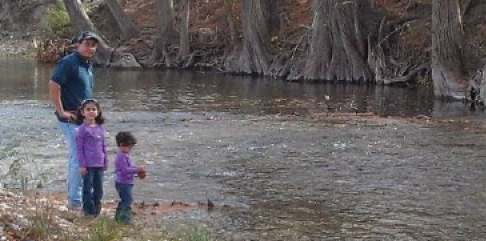At RA Materials LLC, Aggregate Production Is Balanced With Environmental Stewardship.
By Therese Dunphy
Some 22 years ago, Alfredo Avalos, owner of RA Materials LLC, was working on Wall Street when he toured a farm property in Comfort, Texas. At the time, the stockbroker had no plans to become an aggregate producer, but he found himself drawn to the property.
“My broker showed me the property. We walked in, and what really took me aback were the large cypress trees that line the riverfront of the property,” he recalled. “I wanted to own this property because of the trees.” Today, he has an aggregate operation and nursery that allow him to not only provide stone, sand and gravel, but also landscaping materials to the Texas Hill Country.
Capping Water Consumption
The operation began with a couple of screening plants and produced less than 10,000 tons per year. It continued in that fashion for a number of years, but Avalos said that he kept getting requests for washed sand and gravel. One of his big challenges was a limitation on the amount of water that could be used to produce a washed product.

Through research and field trips to other operations, his team identified a mix that would address its needs with an affordable investment. In 2017, RA Materials purchased a small wash plant and designed a recycling area on a U-shaped canal system that feeds back to a recycling pump it uses to feed the wash plant. A rainwater capture area was also created on a flat portion of the property for use within the operation.
“When we set up this water recycling area, we did a lot of research,” Avalos explained. “Of the 10 million gallons that we were allowed to pump from our well, we only used 2.5 last year because of how well we were doing with recycling and capturing water from rain.”
At the same time, the company invested in new wheel loaders, larger processing equipment and conveyors, and expanded its production footprint to approximately 10 acres. Annual production increased to about 75,000 tons.
The company’s nursery also helps the site mitigate any issue with fines. It captures silt before it goes into the pond and mixes it with soil mixes, compost, sand and soil to create a growing mix. “Since we have the nursery knowledge, we know what we can use it for,” he said.
Creating Biodiversity
The nursery operation joined the mix about five years after aggregate operations began. With much of early production being used for landscape purposes, customers asked about plants, so expansion into that arena made sense.
Over time, water issues have also helped drive that segment of the business toward drought tolerant plants. In 2017, it became a strictly xeriscape nursery. Avalos noted that the trend to remove grass yards that need to be watered and install cactus, succulents, yuccas, and the like, ties into the company’s commitment to be water wise.
“There’s a limited amount of water. In the area we’re in, most people live on well water,” Avalos explained. His goal is to encourage the use of water for living versus watering non-native plants that have difficulty surviving in the local environment. “We’re trying to educate people,” he added. “That’s really one of our biggest core values – to create a learning environment.
“When you reintroduce native plants to the area, you start rebuilding the natural cycle. It starts with the soils, but then the plants attract insects, the insects get eaten by the birds, and the birds get eaten by the foxes or the bobcats. That’s all I wanted,” Avalos said. “So a lot of good things have come about because of what we’re doing here.”
Therese Dunphy has covered the aggregates industry for nearly 30 years, while also serving multiple roles as a public official. As the owner of Stone Age Communications, she provides communications consulting services to help aggregate producers build stronger relationships within the communities they serve. She can be reached at [email protected].
